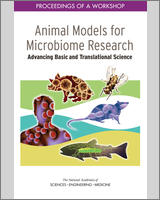NCBI Bookshelf. A service of the National Library of Medicine, National Institutes of Health.
The surface of the human body and its mucous membranes are heavily colonized by microorganisms. Our understanding of the contributions that complex microbial communities make to health and disease is advancing rapidly. Most microbiome research to date has focused on the mouse as a model organism for delineating the mechanisms that shape the assembly and dynamic operations of microbial communities. However, the mouse is not a perfect surrogate for studying different aspects of the microbiome and how it responds to various environmental and host stimuli, and as a result, researchers have been conducting microbiome studies in other animals.
To examine the different animal models researchers employ in microbiome studies and to better understand the strengths and weaknesses of each of these model organisms as they relate to human and nonhuman health and disease, the Roundtable on Science and Welfare in Laboratory Animal Use of the National Academies of Sciences, Engineering, and Medicine convened a workshop in December 2016. The workshop participants explored how to improve the depth and breadth of analysis of microbial communities using various model organisms, the challenges of standardization and biological variability that are inherent in gnotobiotic animal-based research, the predictability and translatability of preclinical studies to humans, and strategies for expanding the infrastructure and tools for conducting studies in these types of models. This publication summarizes the presentations and discussions from the workshop.
Contents
- The National Academies of SCIENCES • ENGINEERING • MEDICINE
- PLANNING COMMITTEE FOR A WORKSHOP ON ANIMAL MODELS FOR MICROBIOME RESEARCH: ADVANCING BASIC SCIENCE AND TRANSLATIONAL RESEARCH
- ROUNDTABLE ON SCIENCE AND WELFARE IN LABORATORY ANIMAL USE
- INSTITUTE FOR LABORATORY ANIMAL RESEARCH
- Acknowledgments
- Reviewers
- Acronyms and Abbreviations
- 1. Introduction
- 2. A Trans-Kingdom Perspective on Animal Models and Microbiome Research
- 3. Non-Rodent Models for Microbiome Research
- 4. Modeling Human Microbiota in Animal Systems
- 5. Experimental Reproducibility Using Gnotobiotic Animal Models
- 6. Establishing and Evolving Gnotobiotic Facilities
- 7. Reflections on the Workshop
- References
- APPENDIXES
Rapporteurs: Jenna Ogilvie, Lida Anestidou, and Joe Alper.
Suggested citation:
National Academies of Sciences, Engineering, and Medicine. 2018. Animal Models for Microbiome Research: Advancing Basic and Translational Science: Proceedings of a Workshop. Washington, DC: The National Academies Press. https://doi.org/10.17226/24858.
- NLM CatalogRelated NLM Catalog Entries
- Review Animal Welfare Challenges in Research and Education on Wildlife, Non-Model Animal Species and Biodiversity: Proceedings of a Workshop[ 2022]Review Animal Welfare Challenges in Research and Education on Wildlife, Non-Model Animal Species and Biodiversity: Proceedings of a WorkshopNational Academies of Sciences, Engineering, and Medicine; Division on Earth and Life Studies; Institute for Laboratory Animal Research, Sylvina TJ. 2022 Dec 7
- Review Health Communication with Immigrants, Refugees, and Migrant Workers: Proceedings of a Workshop—in Brief[ 2017]Review Health Communication with Immigrants, Refugees, and Migrant Workers: Proceedings of a Workshop—in BriefHealth and Medicine Division, National Academies of Sciences, Engineering, and Medicine. 2017 Jun 2
- Review Communicating Clearly About Medicines: Proceedings of a Workshop—in Brief[ 2017]Review Communicating Clearly About Medicines: Proceedings of a Workshop—in BriefNational Academies of Sciences, Engineering, and Medicine, Health and Medicine Division, Board on Population Health and Public Health Practice, Roundtable on Health Literacy. 2017 May 16
- Review Transgenic Neuroscience Research: Exploring the Scientific Opportunities Afforded by New Nonhuman Primate Models: Proceedings of a Workshop[ 2019]Review Transgenic Neuroscience Research: Exploring the Scientific Opportunities Afforded by New Nonhuman Primate Models: Proceedings of a WorkshopNational Academies of Sciences, Engineering, and Medicine, Health and Medicine Division, Board on Health Sciences Policy, Forum on Neuroscience and Nervous System Disorders, Stroud C, Posey Norris SM, Bain L. 2019 Feb 8
- Review Advancing Disease Modeling in Animal-Based Research in Support of Precision Medicine: Proceedings of a Workshop[ 2018]Review Advancing Disease Modeling in Animal-Based Research in Support of Precision Medicine: Proceedings of a WorkshopNational Academies of Sciences, Engineering, and Medicine, Division on Earth and Life Studies, Institute for Laboratory Animal Research, Roundtable on Science and Welfare in Laboratory Animal Use. 2018 May 30
- Animal Models for Microbiome ResearchAnimal Models for Microbiome Research
Your browsing activity is empty.
Activity recording is turned off.
See more...
